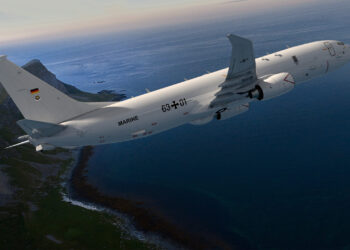UK Ministry of Defence,
Royal Navy frigates HMS St Albans and HMS Richmond both sailed from Portsmouth Naval Base this morning to conduct maritime security patrols in the Mediterranean and the Gulf respectively.
HMS St Albans will join a NATO Task Group in the Mediterranean and conduct maritime security patrols protecting busy shipping trade routes and providing a visible presence in the region.
Joining the NATO-led 'Operation Active Endeavour', the frigate will help monitor illegal maritime and air activity throughout the Mediterranean. Actively providing maritime and air patrolling and surveillance since October 2001, the NATO security operation has proved an effective deterrent to terrorist-related illegal activity, significantly improving security in the Mediterranean.
Commander Adrian Pierce, Commanding Officer of HMS St Albans, said:
“After successfully completing our operational sea training in December and enjoying some well-deserved Christmas leave, we have worked really hard these last two weeks to be fully prepared and equipped to face any eventuality at sea during the next few months in the Mediterranean. There is a real buzz of anticipation around the ship and we are all looking forward to getting back to sea, working closely with our NATO allies, the shipping industry and the civil authorities, to make a real difference with our presence.”
The NATO Task Group plans to conduct a wide range of activities including participation in Operation Active Endeavour and other joint/maritime exercises that will be conducted in the Mediterranean area.
HMS St Albans will also play a role as part of the NATO Response Force (NRF) providing an immediately available capability to be deployed anywhere that NATO decides there is a mission for the NRF. The ship will also have a varied port visit programme, highlights among the many port visits will be visits to Majorca, Italy and Egypt.
HMS Richmond deploys to the Gulf on Operation Telic as part of the UK's contribution to the international coalition of warships conducting maritime security in the region. The frigate will relieve her sister ship HMS Lancaster which will return to Portsmouth at the end of February following a six-month deployment.
Commander Mark Southorn, the Commanding Officer of HMS Richmond, said:
“HMS Richmond will depart on Monday ready in all respects to make a genuine contribution to the security of the Gulf region; having had extensive training tailored to our mission I am confident that HMS Richmond and her ship's company are able to deal with any eventuality.”
Both warships will focus on selected maritime contacts of interest, tracking and monitoring suspect vessels to determine their operations. Vessels may be boarded by Royal Navy teams and full inspections of cargo, documentation and crew may be carried out.
Powerful and versatile, the Royal Navy's Type 23 frigates form 50 per cent of the total frigate/destroyer force in the Royal Navy. Originally designed for the principal task of anti-submarine warfare, they are multi-purpose ships with the capability to operate anywhere in the world.









